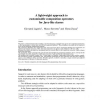Free Online Productivity Tools
i2Speak
i2Symbol
i2OCR
iTex2Img
iWeb2Print
iWeb2Shot
i2Type
iPdf2Split
iPdf2Merge
i2Bopomofo
i2Arabic
i2Style
i2Image
i2PDF
iLatex2Rtf
Sci2ools
ENTCS
2010
2010
A Lightweight Approach to Customizable Composition Operators for Java-like Classes
We propose a formal framework for extending a class-based language, equipped with a given class composition mechanism, to allow programmers to define their own derived composition operators. These definitions can exploit the full expressive power of the underlying computational language. The extension is obtained by two simple steps. First, meta-expressions, that is, (expressions denoting) class expressions, are added to conventional expressions. Then, such meta-expressions can appear as class definitions in the class table. Extended class tables are reduced to conventional ones by a process that we call compile-time execution, which evaluates these meta-expressions. This mechanism, which is trivial in itself, poses the non-trivial problem of guaranteeing soundness, that is, ensuring that the conventional class table, obtained by compile-time execution, is well-typed (in the conventional sense). This problem can be tackled in many ways. In this paper, we illustrate a lightweight solut...
| Added | 10 Dec 2010 |
| Updated | 10 Dec 2010 |
| Type | Journal |
| Year | 2010 |
| Where | ENTCS |
| Authors | Giovanni Lagorio, Marco Servetto, Elena Zucca |
Comments (0)

